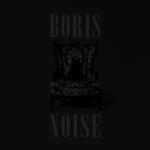
Boris Noise
(Sargent House)
In 2011, the metal-gone-multi trio reverently dubbed Boris (big ups to Melvins) decided to give pop rock and dance a try with their release, Attention Please, an album that explored the basics of verse-chorus-verse atop rhythmic persistence and spare and accessible instrumentation. I still consider it a fascinating listen. While the change in direction for the band creatively was likely met with less resistance thanks to Heavy Rocks, (an album simultaneously released with Attention Please that saw the band throwing down in its familiar, heavily distorted way), it was still a ballsy move for a band who’d partnered with the likes of Sunn O))) and Merzbow.
With Boris, though, there’s usually an attempt to incorporate something different or unexpected into their repertoire and rarely do they deliver the same album twice (even if they recycle album titles like Heavy Rocks). Enter Noise: the band’s latest opus, which is more or less a return to the primal scream of past albums though built with hooks in mind. To put it simply, Noise attempts to synthesize what Boris has explored with both Attention Please and Heavy Rocks, its contents rife with the band’s affection for both the dialed up menace of guitars and the pop-sensible ease with which one can bait the ears until the hook is set. The emotional resonance of Melody demonstrates as much, its impassioned post-hardcore lock appropriately driven by dance rhythms, harmonized back ups and amplified riffs. By introducing Noise with enough of an indication that contemporizing its oft-loud rock/drone/metal hybrid remains a creative pursuit, Boris convinces skeptical ears (at least, they convinced mine) that it’s a pursuit worth exploring. More convincing is the following track Vanilla, its melodicism splintered enough to enhance the song’s accessibility without sacrificing its aggression. Vanilla’s second act is a riff-propelled breakdown. While there’s guitar soloing aplenty and a sturdy groove to ride through its remaining couple minutes, Boris uses the backdrop as an opportunity to build more melodies, an aggro-emotive and captivating outro. Though softening up Vanilla’s initial intensity, the slowness provides a decent enough set-up for the following track, Ghost of Romance, which is more of an ethereally charged ballad, haunting fretwork fading in and out of the expanse.
While the shoegazing doom metal of Heavy Rain, the only track sung by guitarist Wata, reaches farthest into Boris’s louder, more seismic material, - its aural heft and sluggish tempo relatively huge next to the rest of the album in terms of density - the impressive 18-plus minutes of Angel is the album’s most ambitious offering. Thematically tied to a four-note intro, the song transitions from a lengthily meditative and ritualistically percussive movement (similar to some of the more dreamy excursions from Sleep frontman Al Cisneros’s psych-duo, Om) into a beautifully realized alt-metal jaunt that then progresses into tangents of experimental dissonance before returning full-circle to its intro. The production on the track is exquisite: the guitar solos gloriously rendered, the low-end viscous beneath the clean drum sounds and then the high-frequency walls of atonal enormity that abruptly halt revealing only those minimal guitar notes which bring the song to a close. It’s the type of song that reveals new points of appreciation with every listen.
Well-sequenced following the relative peace of Angel’s final minutes, Quicksilver opens with bursts of snare blasts as if to interrupt the deepened calm the song’s final act had bore and nurtured. Accompanied by a screaming vocal on par with The Body’s Chip King, bassist/vocalist Takeshi provides impassioned weight to the track’s intensity, a skeletally propagated and mostly simple punk-infused execution followed interestingly by an amalgamation of sludge riffs and static. A two and a half minute instrumental called Siesta brings the album to a close, a restful pace and effective distance to its tone.
Still versatile and willing to embark on any number of musical ideas, Boris have evidently tapped into a fertile means of inspiration, their more than twenty years as an active and respectable rock presence confirmation of the band’s importance and value. With the exception of the very syrupy Taiyo No Baka, (an apparently "dark" song despite its relatively chipper demeanor), Noise fuses the best aspects of every genre Boris tackles, perpetuating their evolution with the promise of aggressiveness, distortion and all things wonderfully “loud.” Noise is what one might call “catchy in a good way.”
23 June, 2014 - 05:12 — Sean Caldwell